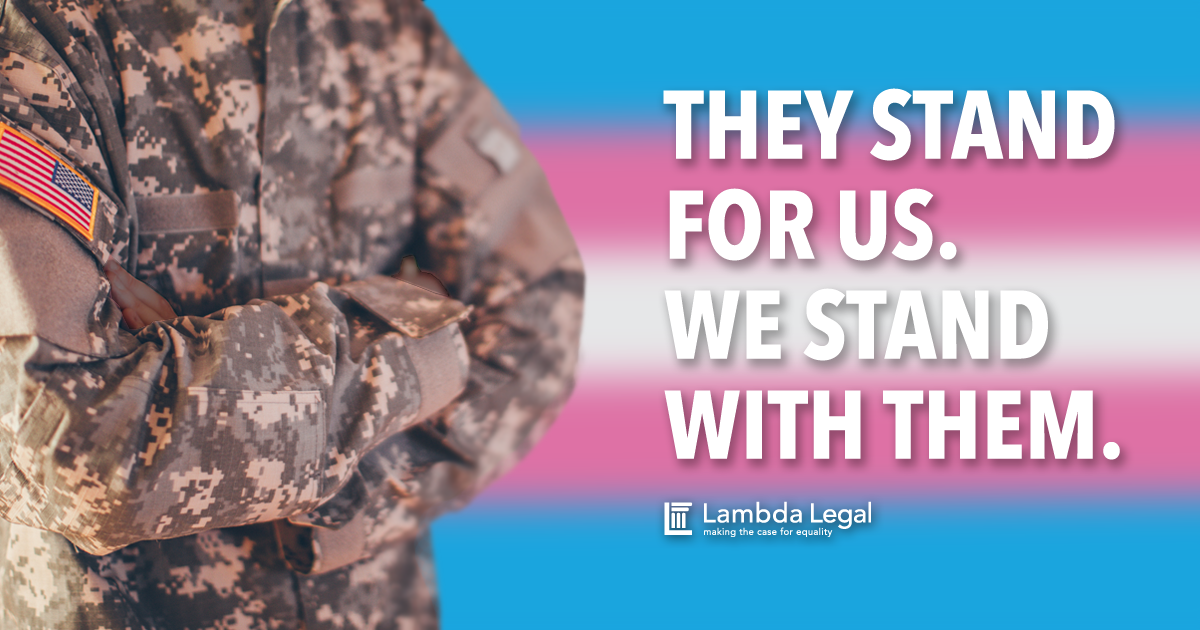Dozens of retired U.S. military officers and former national security officials have joined states attorneys general, the country’s leading medical associations and leading civil rights organizations – including the NAACP Legal Defense Fund – in nine friend-of-the-court briefs urging the U.S. Court of Appeals for the Ninth Circuit to uphold the lower court ruling in Karnoski v. Trump and maintain the ban on implementation of the Trump administration’s discriminatory ban on transgender military service.
“Each of these briefs, and the impressive roster of signatories, underscores the myriad ways in which the proposed ban on transgender military service not only harms unit cohesion and morale, but also upends months of extensive research and study that supported ending the ban in the first place,” said Lambda Legal Staff Attorney Sasha Buchert.
“This unconstitutional and discriminatory ban has already lost multiple times in multiple courts, and these briefs demonstrate why such a fate is well deserved. It is well past time to put this ill-conceived “plan” out of its – and our – misery.”
The nine friend-of-the-court briefs filed today include:
Retired Military Officers and Former National Security Officials Brief: A total of 33 former military and national security officers joined this brief, which situates the lifting of the ban on transgender military service to similar points in the history of the armed services regarding integrated units, the ban on women and, more recently, open service by gay men and lesbians.
The brief notes that, in each instance, fears concerning unit cohesion and morale were unfounded. The brief further underscores the extensive study and outreach that went into the decision to lift the ban on open transgender service, as opposed to the rushed ad hoc process behind the proposed policy to re-impose the ban.
NAACP Legal Defense Fund (LDF) Brief: The LDF brief connects the ban on open transgender service to the arguments against service by African-Americans and against integrated military units almost 70 years ago. The brief notes that the justifications the Trump administration cited to re-impose the ban, “Not only are … the same justifications that the previous administration found baseless just two years ago, they are almost identical to the justifications the military used to discriminate against Black soldiers more than half a century ago.”
American Medical Association (AMA) Brief: Joined by 12 medical, nursing, mental health and related health care organizations, the AMA brief cites voluminous medical data and studies to demonstrate that there is nothing related to being transgender that has any bearing on a transgender person’s ability to serve their country.
Former U.S. Armed Services Surgeons General Brief: Joined by the former Surgeons General of the U.S. Army and Navy and the former Director of Health and Safety for the U.S. Coast Guard, this brief argues that the stated reasons for re-imposing the transgender military ban are not supported by the evidence. Link to the brief forthcoming.
The Trevor Project Brief: In its brief, the Trevor Project, the nation’s largest lesbian, gay, bisexual, transgender, queer, and questioning (“LGBTQ”) youth crisis intervention and suicide prevention organization, highlights the harm the ban visits particularly on transgender youth who wish to enlist and to serve their country.
The States Brief: Joined by the attorneys general of 18 states and the District of Columbia, this brief highlights the fact that many states in the United States have explicit nondiscrimination statutes on their books and a keen interest in supporting those statutes. In addition, states command National Guard units and related military support institutions. Military strength and readiness are a key concern for these states.
Sex Discrimination Brief: Joined by 10 organizations that work in diverse ways to advance equal opportunity for women and to combat various forms of sex discrimination, this brief underscores that almost 50 years of constitutional jurisprudence has disallowed the government from embedding assumptions of what constitutes maleness and femaleness into law. However, the proposed transgender ban does just that.
The Constitution Accountability Center Brief: This brief discusses how the proposed ban violates the equal protection guarantee of the U.S. Constitution, and thus must be subjected to heightened scrutiny, a level of scrutiny that the ban clearly fails.
Transgender Civil Rights Groups Brief: Joined by seven transgender civil and legal rights organizations, this brief also underscores why the proposed ban must be subjected to heightened scrutiny and why it fails.
In Karnoski v. Trump, Lambda Legal and OutServe-SLDN represent nine individual plaintiffs – six currently serving members of the armed services and three individuals seeking to enlist – and three organizational plaintiffs: the Human Rights Campaign (HRC), Seattle-based Gender Justice League, and the American Military Partner Association (AMPA), who joined the lawsuit on behalf of their transgender members harmed by the ban.
On April 13, the U.S. District Court for the Western District of Washington affirmed its earlier preliminary injunction and barred implementation of the transgender military ban, rejecting the Trump administration’s claim that its plan to ban transgender people from serving openly in the U.S. Armed Services, released March 23, passed muster.
Instead, the court found that plan to be a retread of the original ban, not a new policy, threatening the very same constitutional violations. Furthermore, the court also found that the effort to ban transgender people from military service must meet the most demanding level of scrutiny because it targets transgender people for harm.
The Ninth Circuit is considering the Trump administration’s appeal of that lower court ruling, and the amicus briefs submitted today are in response to that appeal.
The case itself is on track to go to trial in April 2019 before the U.S. District Court in Seattle.





